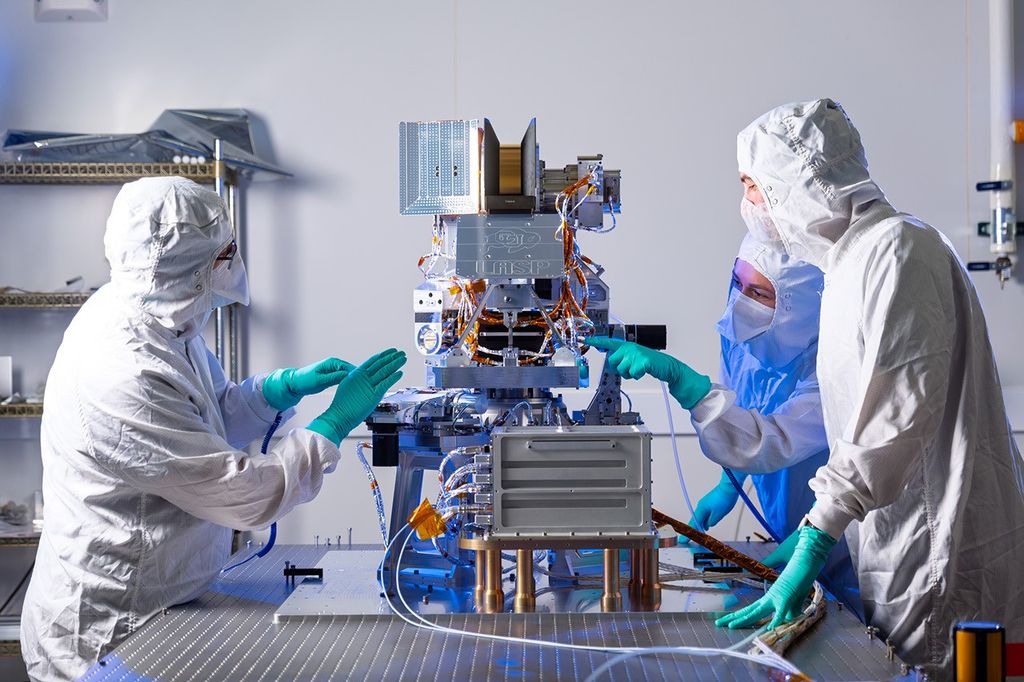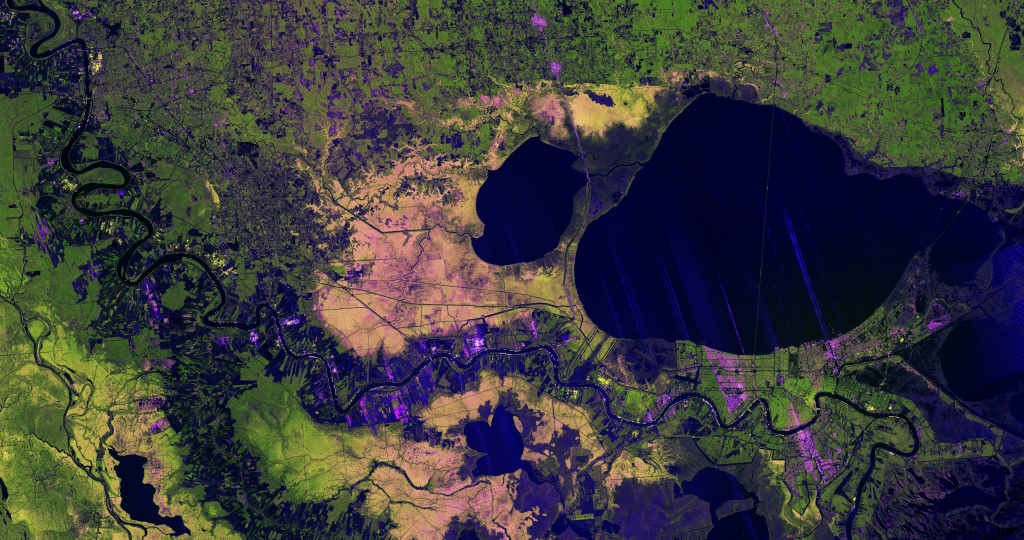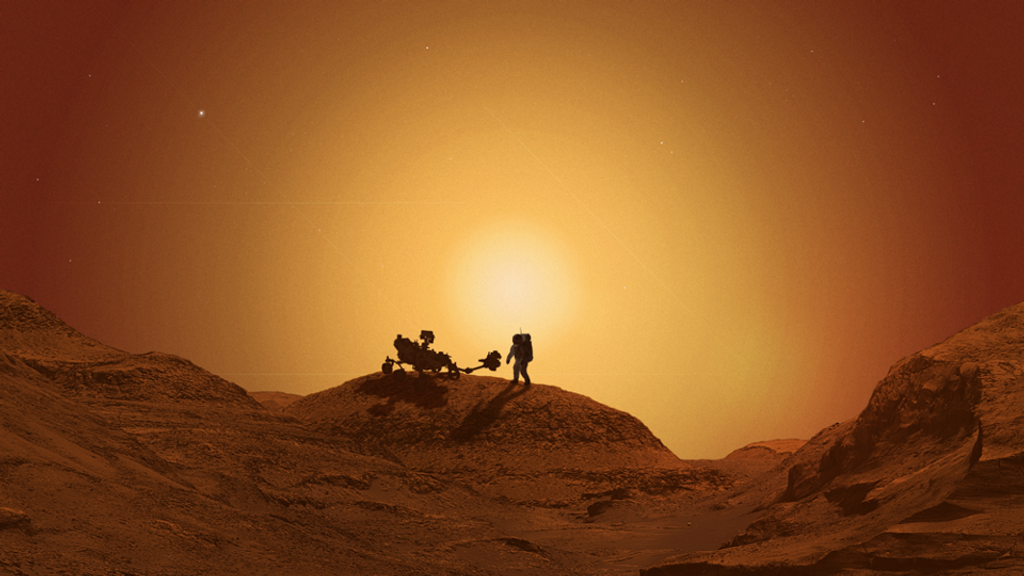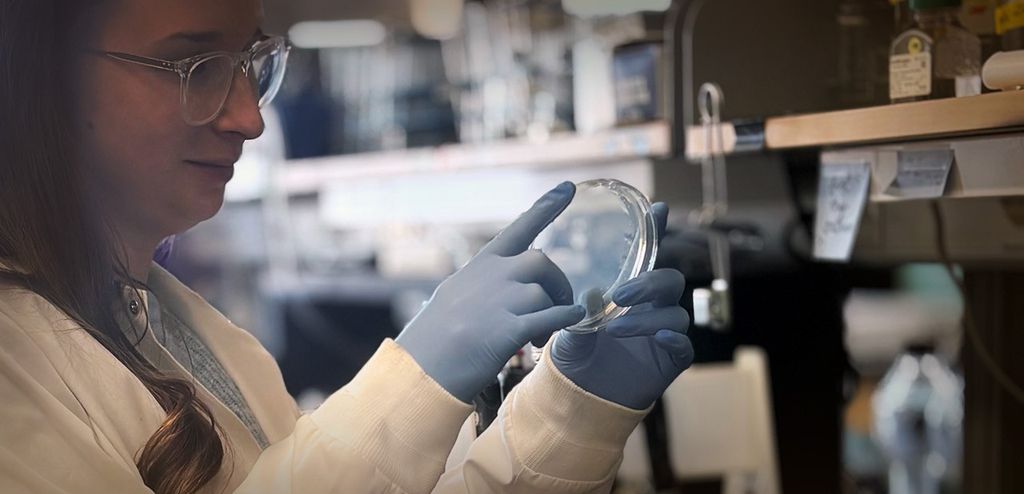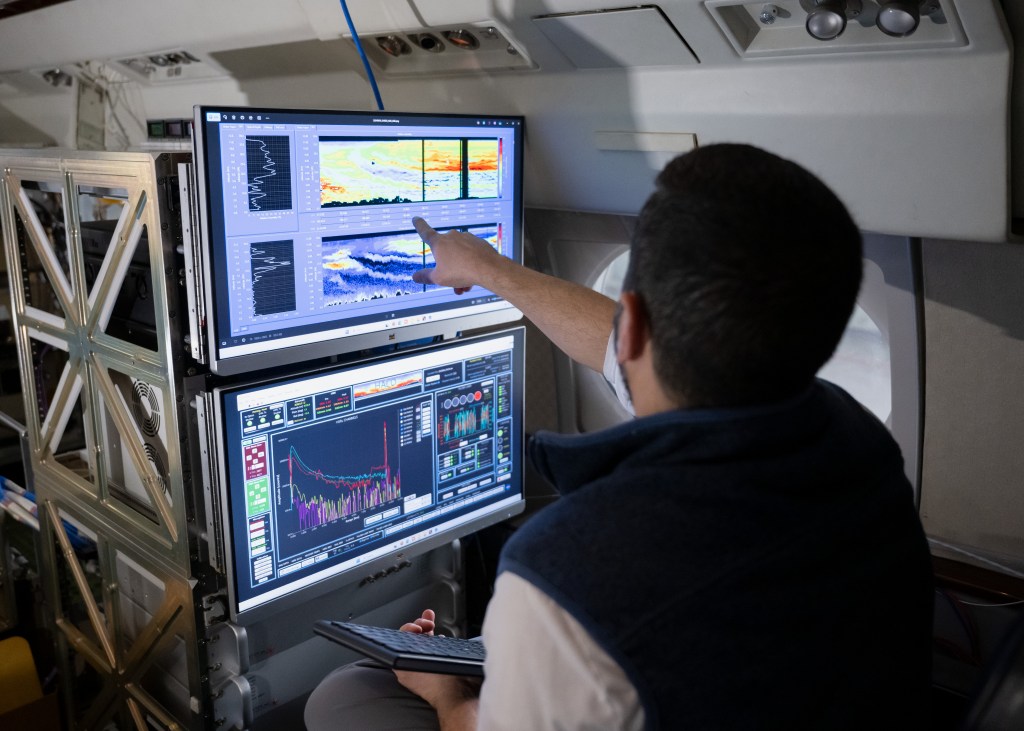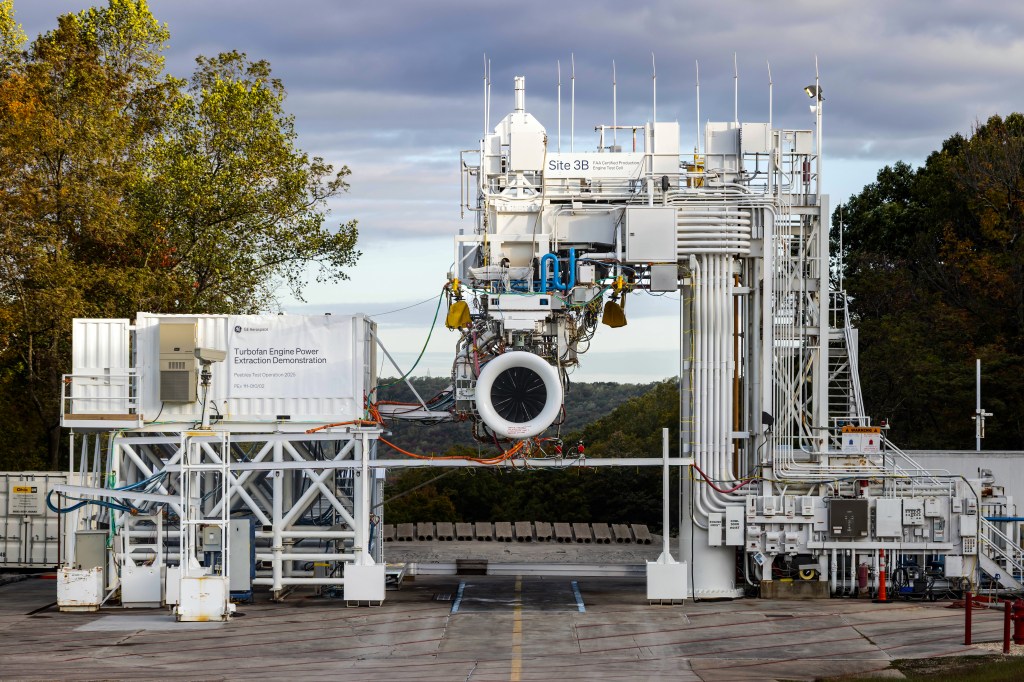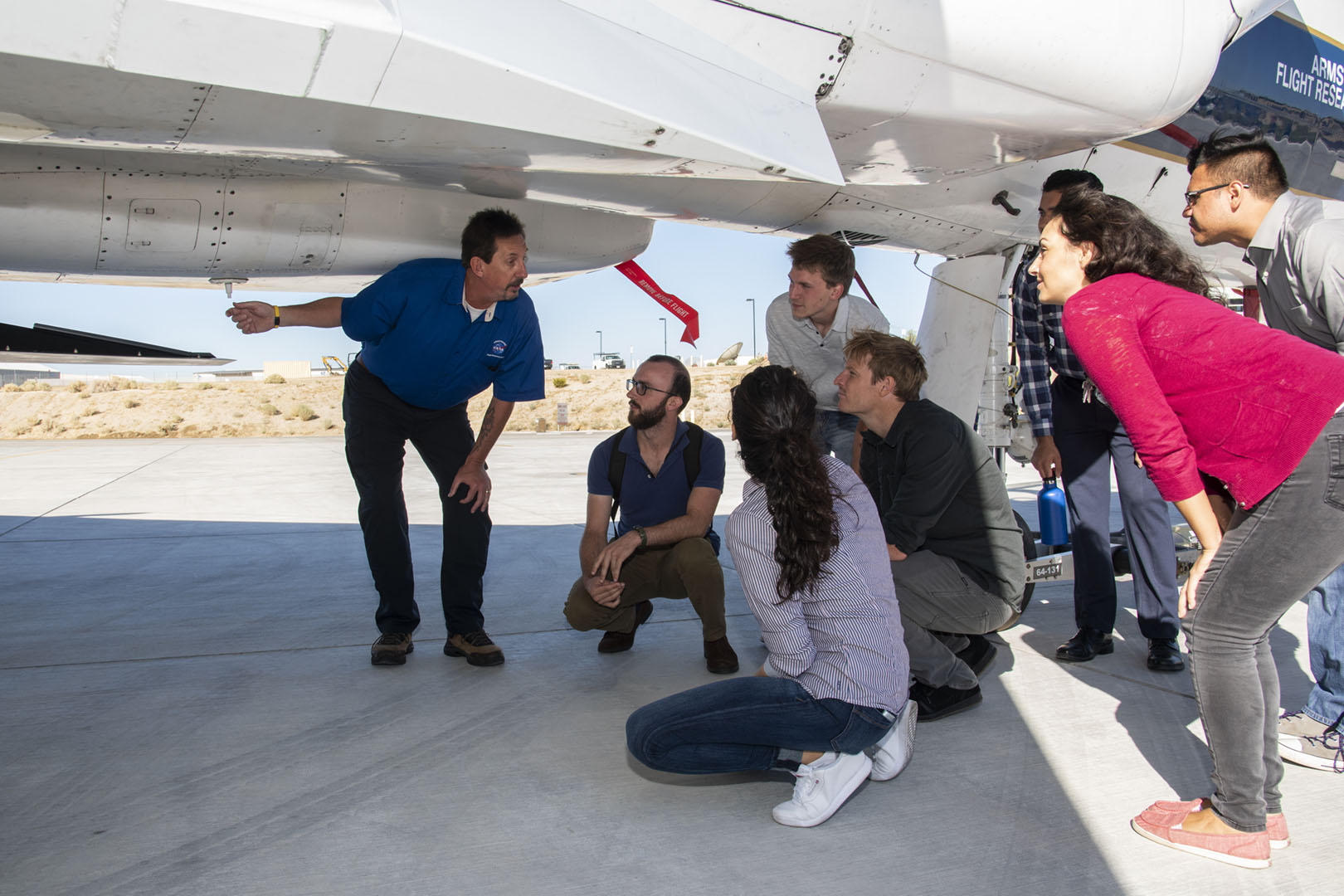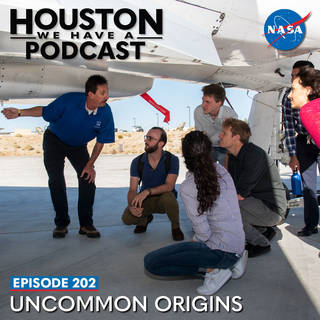
If you’re fascinated by the idea of humans traveling through space and curious about how that all works, you’ve come to the right place.
“Houston We Have a Podcast” is the official podcast of the NASA Johnson Space Center from Houston, Texas, home for NASA’s astronauts and Mission Control Center. Listen to the brightest minds of America’s space agency – astronauts, engineers, scientists and program leaders – discuss exciting topics in engineering, science and technology, sharing their personal stories and expertise on every aspect of human spaceflight. Learn more about how the work being done will help send humans forward to the Moon and on to Mars in the Artemis program.
On Episode 202, Shawn Cvetezar, Laura Paulino, and Don Caluya, NASA interns representing NASA’s Marshall Space Flight Center, Ames Research Center, and Johnson Space Center, respectively, reflect upon the non-traditional paths that led them to NASA and share the many areas and projects that are benefitting from their experience. This episode was recorded on May 27, 2021.
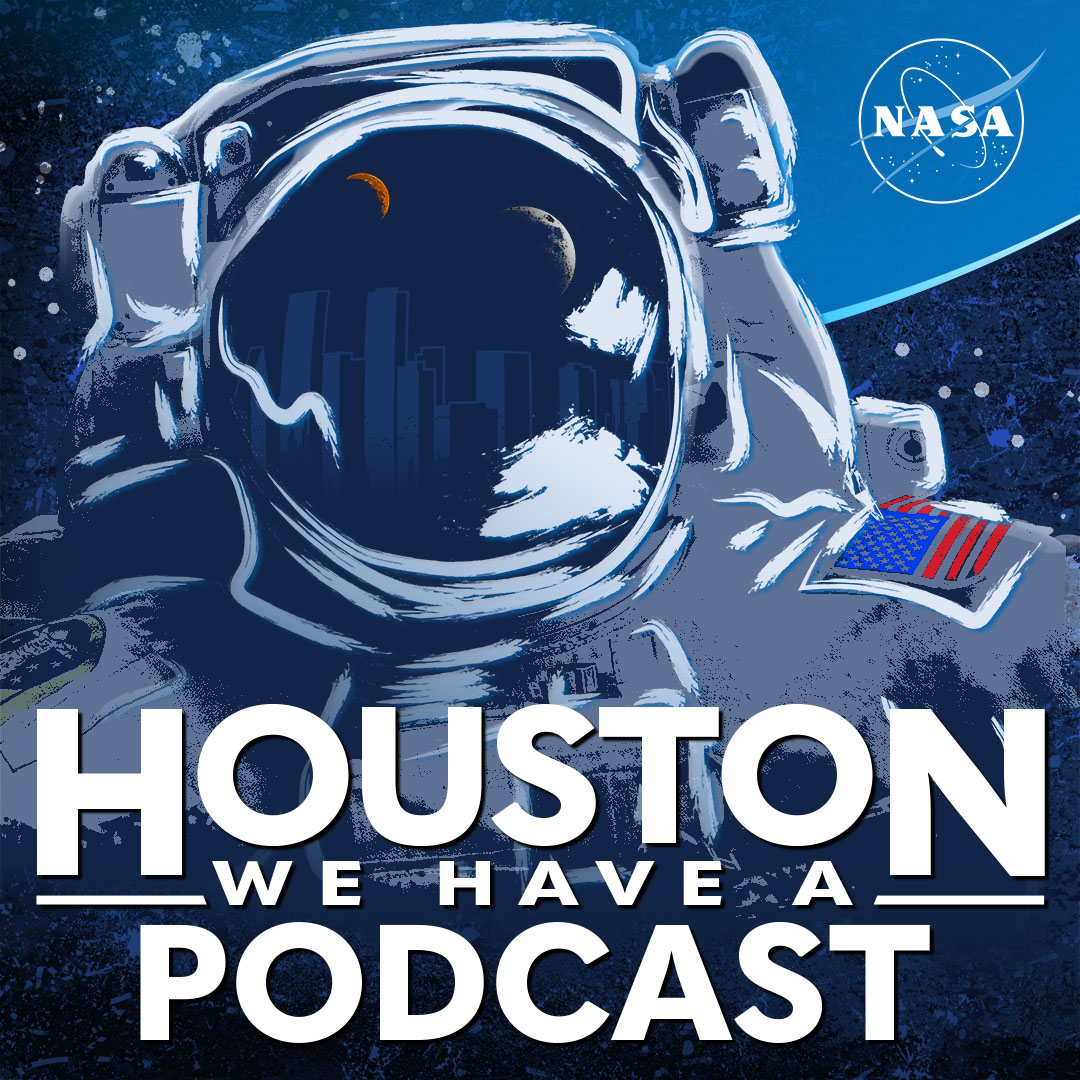
Transcript
Gary Jordan (Host): Houston, we have a podcast. Welcome to the official podcast of the NASA Johnson Space Center, Episode 202, “Uncommon Origins.” I’m Gary Jordan, and I’ll be your host today. On this podcast we bring in the experts, sometimes we bring in folks who will become the experts. On this episode, we’re bringing in interns who took unusual paths to get to NASA. I should probably add some context on what the usual path is. Engineering is by far the most common, you’ve got your science, your math; they come right out of college, and they start a couple rotations here at NASA. Now when you think of NASA, you probably think, this is probably who you think of, and you might think, well, that’s not for me, I can’t join NASA, I’m already past that time. But the agency is so much more. So, joining us is Shawn Cvetezar, Laura Paulino, and Don Caluya. They’re coming from three different NASA centers to share their stories of taking nontraditional paths to get into NASA. They’ll show their experiences and discuss how to work at NASA if you’re thinking about applying. If you’re not thinking about applying, I hope you stick around anyway. This is the next generation we’re hearing from, and it was really cool to talk to them. So, here’s a conversation with interns from uncommon origins, and that through hard work, determination, and a splash of luck, ended up working at NASA. Enjoy.
[ Music]
Host: Shawn, Laura, and Don, thank you so much for coming on Houston We Have a Podcast today. I’m excited to talk to all three of you. This is a very diverse conversation we’re going to have. We have folks from different backgrounds, we have folks from different centers, and I really want to dive right into it. I want to start with hearing from each of you, so everybody gets familiar with your voices, and we’re going to learn little bit about you, your background and who you are as a person and how you ended up at NASA. Shawn Cvetezar, we’ll start with you.
Shawn Cvetezar: Yeah, my name is Shawn Cvetezar. I live in San Diego, California. I attend the University of North Dakota as a distance learning student for mechanical engineering, and I’ll be specializing in machine design. Let’s see, I started high school, right out of high school, I was in in the automotive dealership industry until about 2011. I dabbled in some massage therapy for about four years until my body couldn’t handle it anymore, and I just jumped right into wanting to work for NASA, and then pursuing my degrees slowly. I started at community college, got my associates, now, I’m pursuing about a year-and-a-half that I have left.
Host: OK, so, your nontraditional path is you, you had, I guess, a little bit of a career, and then, you thought, you know what? I want to try my hand at engineering. Is that a fair assumption?
Shawn Cvetezar:Yeah, yeah, there was a funny conversation that I had with my wife’s, or at that time it was my fiancé’s, best friend, who pulled me aside during a Christmas evening, and she said, “How are you going to provide for your wife?” And you know, you hit a cap of pay when you’re working in the automotive industry, especially as like a technician. And also, she noticed that I was not happy with the field. So, that conversation just led, and you know, I went back home a week later, and signed up to Front Range Community College in Denver at the time where I was living, and said, I’m going to do it.
Host: Well, it sounds like you still like working with your hands, because you ended up in mechanical engineering, is that right?
Shawn Cvetezar: Yeah, yeah, that’s the core of my, of my existence, I guess, is building things. I would call myself a maker, a tinkerer. I’m always looking for things to make or build or modify or change or just even tear apart to see how the things work.
Host: Well, very cool. I’m glad to have you on today, Shawn, hearing your interesting perspective. Laura, let’s hear little bit from you.
Laura Paulino: Hi. Yeah, so, I, actually emigrated from the Dominican Republic when I was ten years old. So, my family moved to Connecticut, where I graduated high school. Then I went on to pursue a public health degree at Montclair State University in New Jersey. So then, after that, I actually worked as a health educator for about five years, and I just kind of reached a point in my career, similarly to Shawn, where I felt like there was only so much room for me to grow, not just like as far as pay, but also I wanted to be a little bit more challenged. And I can’t remember the exact moment that I wanted to become like a software developer, but I remember one day I was like really bored at my previous job, and none of my patients had shown up for their appointments. And I typed in — I forgot, I think it was Codecademy, I just did my first like “hello world” in HTML (HyperText Markup Language), and it changed my life. After that, I could not stop. So, I decided to get a master’s degree in computer science, which I’m currently pursuing, and it was, last semester I was doing a project for one of my courses and a team member mentioned that he had an internship with NASA. And he was just like, “Oh, you should apply. You never know.” And I did, and lo and behold, I got my internship at NASA at Ames Research Center, which I completed the first internship in the spring, and now I’m doing my, my second internship. So, it’s kind of a crazy story.
Host: You know, it sounds crazy, but I find that this is so interesting that your, your story, Laura, is about not enjoying what you’re doing and thinking, I want to find something that I’m going to enjoy. So, what you do is you pursue something that you’re passionate about. The NASA thing, it sounds like, just came as an opportunity. You know, something, something happened. It wasn’t something that maybe you are thinking of initially. You were just passionate about software. And then, you just had this thing come up.
Laura Paulino: Yeah, and interestingly enough, too, I was actually really passionate about, I had this epiphany when I was doing a little bit more research on computer science, and I realized that software engineering is female. You know, Ada Lovelace created the first algorithm, and then I started in this whole thing where on my Instagram I started highlighting women in STEM (Science, Technology, Engineering, and Math). And a lot of the women that I did profiles on were actually from NASA, but I never in a million years thought that I would end up at NASA. I was just really fascinated by the story, like the hidden stories, right, of women in STEM, and especially women of color. So, it’s also really ironic that on a social level I have this interest in wanting to be one of those women, like looking up to those women and ending up at an organization where a lot of them made their marks.
Host: Another, another story I hear very often is you find these role models, and they just, they provide that extra boost with something you’re passionate about. Laura, maybe you were interested in software development but maybe, you know, not only does actual technical developing of the software, but there was this people, this person aspect that was driving you. You say, you know what, I want to be like these people.
Laura Paulino: I couldn’t agree more, 100%, because I didn’t have any influence. Like I’m the first person in my family to pursue a career in tech. Being an immigrant, I didn’t see or touch a computer until I was, God, I was 11 years old, and that was in 2003. So, I didn’t grow up with this like connection to tech and computers, and that wasn’t my story. But I think you’re absolutely right, it was definitely the people connection that I think got me here, for sure.
Host: Yeah. Well, I’m glad to have you on, Laura. It seems like we’re getting a good understanding, just between you and Shawn, about just what is an uncommon origin, what is a nontraditional path to getting to NASA. So, Don, round us out. Tell us about your experience.
Don Caluya: Sure. So, I’m Don Caluya. I am a Philippine immigrant. I moved from the Philippines to Michigan when I was six years old. Similar to everybody on this call, I also had multiple career changes. So, at first, I joined the military, I joined the Air Force when I was 21 in 2011, and I was doing that. I was flying for the military in Germany, and we were moving patients. So, I was medical for the military, and we were moving patients, and I had the decision to decide to get out of the military, because I felt like I was stagnant at my career, and I wanted more. So, I chose to get out of the military, and I fell in love with airplanes when I was flying for the Air Force. So, in 2016, I got out of the Air Force and I decided to pursue an aviation degree out of Ohio State, and I was on track to get a commercial pilot’s license. And then, I don’t know if you’re familiar, but trying to fly is really expensive, so, I ended up like diverting and pivoting my career change from that. So, instead of flying I was able to land a job at Boeing after I graduated, my undergrad, and I worked at Boeing for a year. And I also, I still felt like I was still missing something in my career. So, I ended up joining a mentorship program at Boeing, and one of the CFOs (chief financial officer) there, he was actually mentoring me for a little bit, and he — actually, he challenged me to pursue a different career field that I would find, you know, more fulfilling. So, I decided to try to get my master’s degree in business. So, I ended up signing up to get my MBA at Lindenwood University, and that’s where my genesis with NASA started. And I started my first Pathways position in August of 2020, so, in the middle of the pandemic where everything was — through the computer. So, it was fairly difficult, but I’m definitely excited to be part of the NASA team and continue my career with them.
Host: What I’m hearing from all three of you, from Shawn, Laura, and Don, is that throughout, as you got a career, you started in one path, and there was just some moment, maybe it was a series of moments, maybe it was over the course of years, you just realized, man, this is not where I want to be, or it sounds like for all three of you, this is not really going where I want it to go. So, I wonder, Don, from your perspective, what was it that made you think that? Was it maybe a lack of a challenge? Maybe was it the people you that you were surrounded with? Maybe you just had your head up at the sky, and you were thinking about more? What was that feeling that made you want to take such a drastic shift?
Don Caluya: Sure. So, with me, I was the first person within my siblings that graduated with a college degree. So, I sort of wanted to be an example for my younger siblings and try to push them and, you know, have them pursue greatness, to me, personally. But the way I approach my personal life is I, I try to challenge myself first, and if I don’t feel like I’m accomplishing something then I have no problems with moving on. I know that, typically, the old format of careers is somebody gets a job, and they stay at their job for X amount of years until they retire, but me, I have no problem with that, because I personally think I’m a nomad. So, I move with no problems whatsoever.
Host: Well, that’s, that’s certainly something I think I hear a lot, and you’re right. It’s very common for younger folks, for newer generations. They say, you know, Millennials may change their jobs five, six, seven times during their career, and I think it’s all doing what all three of you are trying to do, is you get to a point in your career where you think, this is not going where I want it to go, this is staying still, and I’m not passionate about what I’m doing. So, let me change that. Let me provide a solution by giving myself another opportunity. Don, I’m going to continue with you for a second. I want to understand more about your role here. It seems like you had this crazy path with the Air Force, you were actually flying, then you worked for Boeing. You went back to school for business. When you got to NASA, what are some of the things you’re doing here?
Don Caluya: Sure. So, my first, my first Pathways position was in external relations, where I was doing student outreach for university collaborations, and then, for my second, which is this semester, I’m actually working in ARES, in Astromaterials Research Exploration Sciences. So, I get to work with moon rocks, and I do all the budgeting and finance aspects for that directorate.
Host: Oh, very interesting. So, you have more of an educational sort of side of things, and you’re really exploring all the different areas of your business degree, whether it’s education and organization, maybe project management. Now it seems like you’re more on the finance side.
Don Caluya: Yes, exactly.
Host: What’s interesting, though, is that the ARES program, that’s astromaterials, right? So, you’re dealing with Moon rocks and your dealing with meteorites. What’s it like, some of the ways that you’re working the budget and getting familiarized with how the operations works, with how NASA holds onto and maybe ships all the different meteorites around the world?
Don Caluya:Sure, so, the budgeting aspect of that is actually, it’s very invasive. I’ve only been in the position for four days now, because I started on Monday —
Host: Oh, wow.
Don Caluya:— but, but my mentor has definitely guided me, and he’s definitely a great teacher. So, from what I’ve been doing right now with the budgeting aspect is, right now, I think we just approved, you know, multiple contracts, and they — everything within ARES is fairly time-oriented, so, not only is it invasive but it’s also a process that takes a long time to learn, and I believe I’m slowly getting there, but it’s definitely, definitely hard without taking notes.
Host: Yeah. Shawn, I’m going to go over to you for a second, with your mechanical engineering background, some of the things you learned from school, what are you bringing to the Marshall Space Flight Center?
Shawn Cvetezar:Yeah, I currently — it’s a little bit of a strange situation here. I’m really passionate about like STEM engagement, and I have been since I was with NCAS, the NASA Community College Aerospace Scholars, back in 2018. So, right now I’m working with the Human Exploration Rover Challenge out of the OSTEM (Office of STEM Engagement) department here in Marshall, well, virtually, that is. And we’re just doing product development. I first came on as an SME in the spring, so, a subject matter expert, and I was just working with the students for the first year of our reviews, because beforehand it was just sign up to do our rover challenge, and bring what you bring, and the following spring, so there wasn’t much oversight throughout it. So, they decided to change it up, and we’re doing reviews now. So, I was part of the judging system for that, asking the students questions, engaging them, asking about their designs. And then also, the HERC staff was leaning on me for my — just my overall background in the automotive industry and such, just to help develop the constraints and the rigor for the competition. Right now, I’m working on the handbook. There’s a whole new handbook that we’re providing, which has different rules and regulations and expectations and formatting for their reports and such. It’s been really rewarding to reach out to the students, especially because the program reaches worldwide. We have students from India, Colombia, I think we have a team coming up from Spain next year. We have one from the Rio in Brazil. It’s great to see these students also on virtually.
Host: So, it seems like all you guys have been having a remote experience, for the most part. So how has that been, Shawn, from working with all these students. It sounds like you would have to work with a lot of them maybe remotely anyway, but what’s it like doing all this organization and kicking off these programs in a remote position?
Shawn Cvetezar: I feel like my focus might be directed more.
Host: Oh, nice.
Shawn Cvetezar:I’m a social person. I like, you know, walking into the office when I have free time and talking to someone, or whatnot. So, that sometimes can get in the way, which, but there are aspects where like, if you’re sitting at a table, a roundtable, working at a project, you can easily ask a question, and that’s not always possible. So, you have to be really methodical about your notes and bringing up topics during tag-ups and meetings and such. It’s really helped with my time management being virtual, as I’m also a full-time student during the spring. I’m also taking classes this summer. So, it can be difficult and rewarding at the same time. Obviously, I don’t have to get fully dressed every day, I can stay in my pajamas for a couple hours if I need to be. But I do try to present myself professionally, you know, during meetings and such like that.
Host: Do you get to have some face-to-face time with some of these students?
Shawn Cvetezar:During the review sessions, yes. Just when they’re presenting their, their project. Yeah, there’s a video face, if the bandwidth allows. Sometimes the international students have issues with bandwidth, depending what area they’re at. Yeah, it’s great to interact with a student from, let’s say, India or Rio de Janeiro or in Colombia. It’s really great to see the passion and drive that the international students have. And we also we do the national students, and there’s some grassroots teams, community teams, that have started that they’re not even with a specific organization, they’re just a community that brought in like a bunch of high school students, because we do deal with the high school and community college and college and university teams.
Host: Yeah, see, that’s, I think, one of the best parts about working with students. I got to do it a couple of times when I was a student. I did a rotation over in the — it was education at the time, but now it’s OSTEM. And I got to work with students on, the program was High School Aerospace Scholars. And it was just so, one of the coolest parts was when I was working with the students, to look at their faces. You know, they were happy, they were engaged, they were nervous and intense when it came down to like the, executing their projects and everything, and it was just this wild range of emotions. And you can, I think one of the best parts is you can literally see these students, you know, maybe a couple of them, maybe not all of them, but maybe a couple of them, were so passionately engagement in what they were doing that they were about to dedicate a career to some sort of science, engineering, math; maybe even NASA. And it’s really cool, because you get to be right there looking at it and witnessing it firsthand.
Shawn Cvetezar:Yeah, yeah, it’s, it’s, we’ve had a few students, at least I had a few engagements with students, they’re like after this program, and it was their first year, and they’re like I definitely want to pursue a career in engineering, especially with the high-school students. It’s also great to see them, you know, covering themselves in NASA swag and see the NASA signs in the background. And it’s great to change a life early on. That was one of my key goals to achieve throughout my education was to help inspire the generation below me, as I am almost 40 years old in August. So, I mean, technically, they’re my future. So, I want to make sure I have a good one.
Host: There you go. That is perfect. Laura, I’m curious to hear about your experience at Ames Research Center.
Laura Paulino: Yeah, it’s been, so far, it’s been an incredible experience. I absolutely relate to Don and Shawn with the virtual experience.
Host: Yeah.
Laura Paulino: When it first started, it was a little bit difficult, I think, to start. So, my first internship last spring, I actually also interned for OSTEM, and I just did research on diversity and inclusion. And now, with this internship that I started this week, I’m working under Dr. Parimal Kopardekar, and it’s actually a project to, you create an exchange platform to use drones in the event of emergency. And I’m kind of — it’s a little bit of a bummer, because if it had been in person I would’ve been building drones and testing them with the Navy. But since it’s virtual, you know, it’s obviously, catered towards something different, where it’s just, basically, creating like a network, a chain of communication, for the deployment of drones when needed. But outside of that, it’s been great so far. I feel that NASA’s a really great place to just learn more about what everyone is doing. I have not had, like, a case where I ask someone, like, hey, can I talk to you and ask a few questions about your role and what you do in your team; everyone has been so open, and they kind of want you to like engage and kind of include yourself in things. So, I kind of like to poke around and just say, hey what is this club about, when do you guys have a meeting, or contacting people directing and saying, can I take an hour of your time just to kind of pick your brain? And it’s just, I’m finding, you know, Ames to be such a like an open welcoming space for that. So, so far, I love it, yeah.
Host: I think what’s interesting about all three of you is — whenever you were pursuing something, and I think this is something students may struggle with now, is it kind of feels like whenever you’re, whatever it is, 18, 17, 18, and you have to decide what do you want to go to college for, you know, you dedicate your four years to it, but what if at the end of that you dedicate four years and you dedicate, whatever it is, an associate’s degree, you get a job and you start entering into that field, and you realize, “oh, man, I made a huge mistake; I’m not passionate about this at all. I want to do something completely different.” Laura, I think your story is interesting because you started in health, and then you moved onto something completely different, software development.
Laura Paulino: Yeah.
Host: So, I want to start with health first. What got you, you know, in the high school area, what got you into saying, you know what, maybe health is something I want to try, something I want to pursue, something I want to start having a career in, and then, the moment where you think, I am passionate now about something else.
Laura Paulino: Yeah, so, to your point, I actually, which I will touch up on a little bit more after I answer that first question, but I don’t actually believe in passion.
Host: Oh.
Laura Paulino: It’s kind of a bizarre thing to say, but I found that passion was very damaging to me in my journey, because one of the things that I always knew that I wanted to do in my life and through my career was contribute to the development of society in a positive way. And at that time in high school, I related a lot to health, being from an underdeveloped community where we didn’t have a lot of resources. I felt that, you know, health is wealth. So, for me, it was like what is the most important thing to a human being? And I just thought health, and I loved it. I achieved some of my goals while being a health educator. I did some like sexual health education for high schoolers in the city of Paterson, New Jersey, which was an amazing experience. But I got to a point where I realized, while I was working in the health care setting, that there’s a bigger system at play. That my health education, you know, one-on-one sessions with individuals, while I was making a direct, you know, impact and influence in my patients’ lives, I wanted to be a part of something that was bigger, making a bigger kind of like long-term impact in society as a whole. And I’ve always been very future-driven, and I really connected with technology because there’s a lot of problems in the world that I think could be solved by technology. One of the things that I really am interested in is autonomous vehicles. And I always think about how amazing it’s going to be, you know, a couple years down the line when if you hear that someone was injured in a vehicular accident, it’s going to be very, like, what? Because like that, there’s going to be a point in life, you know, one of my dreams is that we get to a point in life where that doesn’t happen. And I just think about safety and health and security, and I think that’s where tech comes in. So, for me, that was my connection to, OK, you know, I am making a direct impact on my patients, but how do I transition into being a part of a system or field where we can make, you know, kind of — I wanted to be a part of the umbrella that was kind of, you know, trickling down change to communities in society as a whole. And I thought, excuse me, I thought technology was — I thought technology was the perfect way to do that. And so, you know, I mentioned about passion. I don’t really, I realize I don’t believe in passion because my whole life I thought I was passionate about health. And, you know, to your point, when you’re 17, when you’re 18, and you have all of this pressure to decide who, at that moment, you feel like you’re deciding who you’re going to be when you’re 40, who you’re going to be when you’re 50. And it’s a lot of pressure on a young person who isn’t necessarily, you know, might not be exposed or aware of things in life that you become aware of later on. And so, once I realized that interest is really enough for you to find things that you love to do, and that you can feel love for multiple things and want to do a lot of different things, once I realized that it really freed me from being tied down to a specific area of, you know, in terms of a career or just even hobby. I just realized, you know, you have this one life and it is your job to just pursue your interests. And sometimes, that may lead to something that you absolutely love and can contribute ten years to, and sometimes, you know, you try something and you’re like, this, this actually isn’t for me. So, yeah, that’s been my story. It started with health, but the general purpose, really, was making an impact, and technology is really, and also one of the reasons why I chose tech is because there’s so many things you could do within it. So, I’m not limiting myself to I only want to do software development, or I only want to do, I think that freedom that falls under the umbrella of technology is also something that I’m very much interested in.
Host: Yeah, but see, listening to your response, Laura, I would argue that you are passionate. Maybe it’s just not what we traditionally think of as passionate about a field, right?
Laura Paulino: Right.
Host: So not, what you’re saying is you’re not passionate about health. Maybe you’re not even that passionate about software development. Where your passion is really coming from is from helping others and making a difference. And how you do that is, you know, it doesn’t really matter what field you go into, you just have to have, it sounds like you’re passionate about having that freedom and that flexibility and that broad sweep of able to apply your skills to many different areas so you can help, you can have the broadest reach to do that thing that you’re very passionate about at your core, which is about helping people and changing the world.
Laura Paulino: Yeah, I could totally see that. I wouldn’t be able to disagree with that. [Laughter]
Host: Shawn, I want to hear from you, because I like this conversation of this switch, and I think this is something that’s so unique to all of you, is you have this one path, and then you just switch. I think what may be difficult to some people, and may be scary, is whenever you go down and you spend so much time, energy, and money on a certain career field, and then you realize, ah, crap, this isn’t for me, right, and I want to do something else. So, what would you say to those students that are maybe having those thoughts right now? That they are in a career, and they’re saying, “oh, no; I might have to switch, because I’m no longer doing the things that I thought I would be wanting to do,” right? “I thought I was passionate about health, but I am actually passionate about helping people, and I think I can actually do that better somewhere else.” Shawn, what would you say to those people?
Shawn Cvetezar:I would say your happiness is priceless. Like, I’m a true believer on do what makes you happy, and if that means dumping everything like, like, I lost, obviously, a lot of money, as an automotive technician, we had to invest in our own tools. So, there’s thousands and thousands of dollars of tools sitting in my garage, but, and also, the price of school. But yeah, happiness is priceless. So, just seeking out that happiness in your life is what matters most, because you don’t want to just be miserable for the rest of your life for a career. And it’s OK. You know, failure grows confidence and moves from there. So…
Host: Yeah, maybe that return on that happiness, right, whenever you make the career, you’re still sort of building up your career right now. You’re going for mechanical engineering, you’re working for NASA. But do you feel, at this point, that it’s headed in the right direction and that you have options to explore, to, you know, make yourself more fulfilled now that you’ve made the switch?
Shawn Cvetezar: Yeah, yeah, I definitely. I have always been really, really passionate about aerospace or space engineering. I grew up as a young kid with the shuttle poster up on the wall. From my father had a bunch of NASA stuff. He had a friend that worked at JPL (Jet Propulsion Laboratory) that would send him stuff that would fall off airplanes and such. And so, I’ve always wanted to be an engineer. I just didn’t have the necessary opportunities at that point. But it’s — difficult to grab into failure, but I didn’t even look at it as a failure. It was more of just continuing on my path and just restarting where I’m going, I guess. It links a lot to what I’m doing, but as far as being in school and the career opportunities and such like that, I’m working on a lot of projects, one with a Boeing, an ex-Boeing CEO (chief executive officer) that was really high up in Boeing, we’re working on electric airplane. I’m also a co-founder and an engineer for a golf putter company, which I don’t even golf. That’s a whole other story on the other side. So, and we just kind of broke through the market on that so we’re really happy with that. And its — I’m always searching for new projects and opportunities. It’s – endless, almost, with the STEM side or engineering side.
Host: Yeah, I find that drive a lot. It seems like everyone’s always looking for the next thing. You know, I think that’s really an important thing to have, to kind of keep you going. What’s interesting me now? You know, what am I passionate about now? And it might not be something that’s super-consistent all the time. I know for me, it’s definitely not. And Don, for you. You know, when you first got into, you know, your high school times, you were thinking about Air Force. And you joined the military, and you started flying because you’re passionate about airplanes and flying. So, talk about that transition from exploring your passion about aviation and flying to taking a business approach.
Don Caluya:Sure. So, with me, the aspect of aviation, like I didn’t have any passion in aviation at all prior to the military.
Host: Oh, wow.
Don Caluya: And when I was sort of just given an opportunity to fly with the military, it’s kind of the start of my love for flying. So, the switch from aviation to business, I wanted to converge both of those career fields together, which is why I wanted to be at NASA. So, that was actually like the part of why I wanted to pursue NASA business is because not only do I, not only can I be part of what I want to do with aviation and, like, see the next generation aspects of flight, but I can also converge my — you know, my degree and my MBA with that.
Host: See, that’s important, and I think what’s interesting is right now it’s not like you’re doing business for aviation. It seems like you’re taking that business degree and you’re applying it to something completely different. Now you’re in the world of meteorites and Moon rocks. But you still get to apply these different things and maybe explore a different career path because you’ve made that switch. You’re not, you know, some people want to be in aviation and be flying their whole lives, maybe that’s something they really, really want to do, but it sounds like this pursuit of business helped you to merge those two things, like you’re saying, but also expanded the possible opportunities, where now you can be working on something you didn’t even know would be interesting to you.
Don Caluya:Exactly. You definitely hit that nail on the head there, because I think having options is definitely a good part of any pivot with a career. So, with me, similar to Laura, when I was flying with the military, I was a flight medic, so, I was in, in medical, and prior to that, I was studying to, or I was studying to be an architect. And I just had so many aspects to how I saw my career going, but just having the focus of what I wanted to be part of is a big aspect as to why I ended up at NASA.
Host: Well, let’s continue on that path for all three of you. Don, we’ll start with you. I think the, the NASA aspect of things is very interesting, because, especially, for all three of you, because now, Don, you’re introducing architect into this mix, too. I don’t even know, I’m getting all mixed up: you’ve got Air Force, you’ve got Boeing, you’ve got business, you’ve got architect. Man, you’re all over the place. But it sounds like there was something about in NASA that interests you. It sounds like, from your description, it was the merging of some of those interests together, but, you know, what was it, what is it that NASA is bringing you now that’s helping you to fulfill those, those thoughts initially, when you first got to NASA, maybe I can merge these couple of things?
Don Caluya: Yeah, well, so, when I was growing up, NASA was always the, sort of like the end game for me, because NASA is sort of the creme de la creme of careers within, within the aviation part, because, you know, there’s the FAA (Federal Aviation Administration) and whatnot, but I’ve always wanted to be part of NASA because they, they have a goal that’s above — it’s similar to what Laura said. It’s above something that is above me. So, like, that’s the reason why joined the military in the first place, because that’s a mission above me. But I also see NASA within that same realm of the military. And I think that they have the opportunity to change humanity, and all the experiments that they do in the ISS (International Space Station) and all the aspects of what they, of NASA’s overall goal, is just so amazing that I just — there’s, there’s so much to learn at NASA that you can’t, you can’t, literally, like, you can literally learn something new every day at work, and I find that so amazing.
Host: That’s, honestly, what’s keeping me going, Don, is that I don’t feel stuck at all; I am constantly learning, I’m constantly challenged, constantly bringing on more work, new things. And it seems that way across the board. You mentioned Laura, and Laura, your pursuit for doing something greater for the benefit of humanity. And I think you mentioned NASA before; you said the opportunity came from a recommendation of a friend?
Laura Paulino: Yeah, yeah. So, I just, I never, ever, ever in my life would have thought that I would ever be affiliated with NASA. Not because it, it just wasn’t like a reality for me growing up, especially not having, you know, like the aerospace background or the engineering background. Like my friend mentioned it, you know, during, while we were working on a project, and my approach to it was just like, well, what’s the worst that can happen? I already don’t think I will get it. So, if I do, like that’d be great. But I never thought that it would happen. So, when it did, I think I cried for like three hours, because I was like in shock when I ended up getting that internship. But you know, as Don mentioned, I feel very similar to him, very strongly about all of that. I think one of the things that I didn’t even realize until now that I’m a part of it, is just how much NASA does, not just in terms of space exploration but just like here on Earth, as well. There’s so many things happening at NASA, and that’s the coolest, I think, part about it and why I’m so curious and I’m always, like, stalking everyone that I come across, because I’m like what do you do, how did you get here? Because everyone has these different projects. And it’s just something, you know, as you both mentioned, I don’t ever see myself being bored, if that word even exists within this, because there’s just so much going on. And when I think of — the general mission, really, is to, you know, be the architects of the future. And it’s just, it’s really exciting to be a part of it because, you know, I have a strong interest in autonomous vehicles, and I find it really interesting that my project right now, I’m working with drones. So, like I want to build robots, and I ended up in a team that, you know, had it been in person, I would’ve been building drones, but you better believe that I’m going to latch on and just like try to get a third internship and keep exploring that, because there’s so many great things happening, and it’s affecting all of our daily lives in such ways that we don’t even think about. You don’t think about, you know, even the project that I’m doing, which is very Earth-focused and centered, which is, you know, using drones for the event of emergencies and, you know, like, for example, like during [Hurricane] Katrina, like drones would’ve brought resources or, you know, during missing persons. Instead of risking more human lives, we could have used a robot to help us keep everyone safe. And those are some interesting things that you don’t really associate NASA with, but it is NASA behind the scenes doing a lot of the things that we, a lot of systems that are in place in, in, on Earth and in the world. So, yeah, I just, I can relate so much to what Don is saying. I feel like even if I were to say, you know what, I don’t want to do autonomous vehicles anymore. I don’t want to do software engineering. I absolutely know that I can find someone else that’s doing another project for my next interest. And I think that’s the coolest part. I feel like a kid in a playground.
Host: Yeah, and kind of building off of that, it sounds like you’re passionate about, you know, changing the world, and it seems like you have an interest in the autonomous vehicle aspect. So, you were able to find that little niche at NASA. Do you think that if someone’s interested in something, whatever it may be, you know, renewable energy or looking at the stars or technology, do you think there is some sort of nook at NASA where people can explore that and dive into it and feel like they’re to contributing to something greater than themselves?
Laura Paulino: A hundred percent, a hundred percent, and it’s like, it’s great, and I think Shawn and Don are like a perfect example of this, because, you know, you have education, you have business, there’s so many different areas. Like it’s not just, of course, you know, like science and aerospace and all of it—it’s a huge part of it—but I think what shocked me, and what’s really intriguing, is that there’s so many different fields that come into play to collaborate together at NASA. It’s really like, you know, it’s like a microworld of just people who share similar interests in just wanting to, you know, I think, I really can’t express it any other way than being the architects of the future…
Host: Yeah.
Laura Paulino:…from all arenas. So, yeah, absolutely. I think anyone can find their niche at NASA.
Host: So, Shawn, you had a lot of interest about, with NASA, earlier in your life, and you said even your dad was an influence on that. It seems like a lot of the things you were interested in was human spaceflight was that initial interest maybe, right? So, a little bit of the shuttle and that kind of thing. Are you getting that same sense that NASA is much more? That there’s a lot to explore when you come here to NASA?
Shawn Cvetezar:Yeah, I have yet to find a career sector that doesn’t exist at NASA. I’ve learned a lot of interesting things while I’ve been here. Like there is a specific psychologist that you can reach out to, and they have weekly meetings that you can go to. There’s people that are just doing video, as you may well know, and creating graphics. And it’s, it’s not just NASA employees, as well, it’s the contractors that NASA hire on, as well. Like I, and literally anyone, can most likely get a position at NASA if they reached for it. It could be business, it could be psychology, it could be human health services. I mean, they’re working on with doctors on trying to figure out the radiation levels, and they’re sending a dummy up on Artemis I to figure out the radiation exposure, especially for females. It’s incredible the reach that NASA, and I think Laura really hit it on the nose of like there is something for everyone here, basically.
Host: There’s a lot of — I feel like there’s more people doing what you three are doing than maybe people realize. They’re going through some sort of crisis maybe—I hate to use that word—but I think, I’m trying to imagine myself in their shoes, and that’s what I would think of is I’ve spent a lot of time and energy in this one field, but maybe it’s time for me to shift, and maybe it’s time for me to put my full energy into, into something else. Are you finding that that is, based on your experience at NASA, based on your experience with making that transition and doing all of these, going through all these changes, that it’s ended up worth it and that you would encourage students who are doing the same thing to keep pursuing those efforts?
Shawn Cvetezar:Yeah. I’ve been fortunate with myself that I have a very supportive wife, but I wouldn’t change anything, as far as the path. I mean, I’ve been in school for quite a while now as well, just plugging along. I haven’t always been able to do full-time work. I wouldn’t, like I said earlier, happiness drives almost every decision that I make. If it’s not going to make me happy or if I don’t specifically want to do it, unless I have to do it, then I don’t. It’s, you reach a point, I think I reached a point in my early 30s that I didn’t want to ever do anything that was going to make me miserable, whether it be living in a certain area or, and obviously, that can be a privileged statement, some people don’t have that choice…
Host: Sure.
Shawn Cvetezar:…but reaching out to resources that don’t necessarily, you’re aware of, and I think that’s where we’re circling back to what NASA has available, like all the different sectors that work for NASA and all the different careers that are available. A lot of people don’t even realize. I mean, I wouldn’t change anything for the world, basically, OK? It’s been completely, 100% worth it, even though I haven’t had a NASA internship specifically for mechanical engineering, like working on robots or space hardware and stuff like that, I’ve learned so much more just on the OSTEM side, especially with product management and stuff like that, but you kind of have to be a one-trick pony, at some point, with NASA, as well, because it’s a culture, you have to learn that culture, as well.
Host: Yeah. Do you feel, though, as you — work at NASA day to day, and you find out more about the different opportunities, and even just on your path as an intern to keep going and, you know, maybe pursue a full time, if that’s something that interests you, do you feel like there’s things that are coming up in the future for you that you’re excited about, new opportunities you’re looking forward to exploring?
Shawn Cvetezar:Yeah, I’m actually trying to wiggle myself into staying on longer with HERC and the OSTEM department at Marshall. I say, if there’s not a position there for you, then create one or try to create one, which they’re open to. That happened to another intern here at Marshall, he was working with an OSTEM group, working on a website for K-12 activities, and they basically, made a position for him. But after that, I really hope to work with NASA on spaceflight, or space hardware, in the near future. I’ve applied to Pathways and stuff like that…or I plan on applying to Pathways, there’s none open at the moment, but I am applying for fall internships, as well.
Host: Nice. Don, what about you? Do you have some things coming up that you’re excited about?
Don Caluya:Yeah, so, for me, I’m still part of the Reserves, so, I actually just got selected to fly MQ-9 Reapers for the Air Force, their drones. And additionally, I applied for the Human Exploration Research Analog, the HERA mission, and I think I’m in selection for that. So, we’ll see how that goes. The first one is going to be in August.
Host: Oh, that’ll be cool. Yeah, you get to be in a habitat for, I don’t know what they’re doing nowadays, 40 days or something like that. So, that’ll be fun.
Don Caluya:Yeah, yeah, 45 days.
Host: Forty-five days, wow, yeah, that’ll be, yeah, good luck.
Don Caluya:Yeah.
Host: Yeah, it takes a specific person to do that. So, yeah, that’ll be interesting opportunities. It seems like there’s a lot to explore. Laura, what about you, things you’re excited about?
Laura Paulino: Yeah, I’m really excited to see how this internship goes, and hopefully, I can continue on, and I’m really eager to, you know, I hope that there’s a possibility to be hands-on, because I want to, you know, touch and like build robots. So that would be incredible. But yeah, this internship that just started, I’m really looking forward to learning and meeting more people this summer and seeing how, how that goes. I graduate with my degree in December. So, I have a little bit of time. I’m trying not to think too much about micromanaging like every month and step of the way, but I’m definitely like, you know, trying to create as many relationships as possible, learn about as many projects as possible, because I think at this space where I am in, I’m just kind of like a sponge. I feel like my job right now is to learn as much as possible. So, that’s what I’m really excited about.
Host: Well, very good. It seems like all three of you have a lot of things coming up, and this was, I mean, just as a whole, I really enjoyed today’s conversation with each of you and learning more about just how you got to NASA. What I think is very interesting is that all three of you have wild backgrounds, just moving all over the place, but somehow, you all ended up at NASA, and here you are making a difference. And so, it’s been really a pleasure for me to get to talk to each one of you today. So, to Shawn, Laura, and Don, thank you all for coming on Houston We Have a Podcast. It’s been a pleasure.
Don Caluya:Thank you, Gary.
Laura Paulino: Thank you, Gary.
Shawn Cvetezar:Thank you very much.
[ Music]
Host: Hey, thanks for sticking around. I really enjoyed today’s conversation with Shawn, Laura, and Don. They all had very, very interesting backgrounds. I certainly learned something today, and I hope you did, as well. If you’re interested in becoming a NASA intern just like these three did, there are couple places where you can go to. Try Intern.NASA.gov or Pathways.JSC.NASA.gov. Don’t worry if you didn’t memorize that, just go to our episode webpage, we’ll have the links for you right there. If you like our podcast, we are one of many at the NASA space agency. We have a couple across centers all over the United States. Go to NASA.gov/podcasts to check out all of them. We, Houston We Have a Podcast, share our story on the Johnson Space Center pages of Facebook, Twitter, and Instagram. Sometimes we get questions and stories, and if you have any of those, use the hashtag #AskNASA. Maybe submit an idea for the show. Just make sure to mention it’s for us at Houston We Have a Podcast. This episode was recorded on May 27, 2021. Thanks to Alex Perryman, Pat Ryan, Norah Moran, Belinda Pulido, Jennifer Hernandez, Abel Morelos, and Veronica Seyl. And thanks, of course, to the interns for taking the time to come on the show. Give us a rating and feedback on whatever platform you’re listening to us on and tell us what you think of our podcast. We’ll be back next week.









